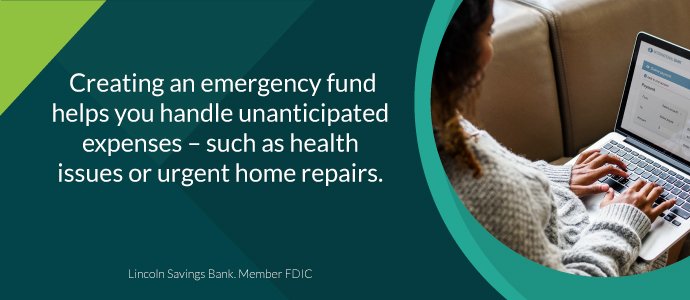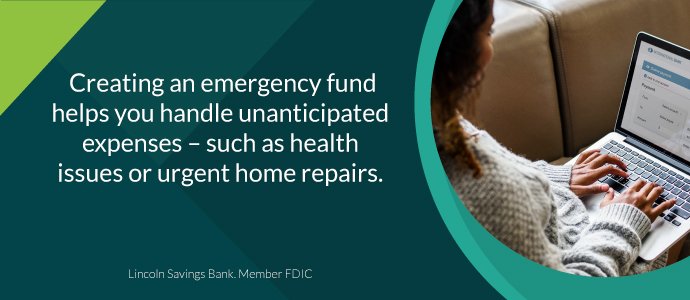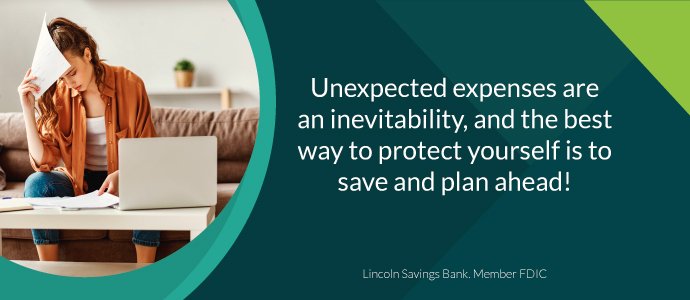
Are you reeling from a surprise medical bill or other unexpected expense? These things happen to everyone, but without adequate preparation, it can be stressful and financially damaging to handle an unexpected expense. In this article, we’ll help you understand what causes unexpected expenses, give you options for handling them, and provide tips for building emergency savings for next time.

What counts as an unexpected expense?
- Medical emergencies: Even if you have health insurance, you may have a high-deductible plan or other coverage terms that mean you’d be on the hook for an ambulance ride, hospital bills, and other costs of the care you received.
- Emergency vet bills: If you have a pet or pets, you probably consider them just as much a part of your family as its human members. So, if they get sick or injured, you of course want to have them treated. However, those vet bills can add up fast, especially if you have to go to an emergency animal hospital.
- Large car repairs: Depending on the age of your vehicle, you may be expecting certain repairs to come up, such as a new timing belt, transmission, etc. But what if you cause an accident and don’t have collision coverage? You’d have to pay to repair or replace your car yourself.
- Major home repairs: As with your car, there are some home repairs you can anticipate and plan for, and others that just pop up out of nowhere. Suddenly the heater dies in the middle of winter, an electrical line fails, the roof starts leaking, etc.
- Last-minute travel: Sooner or later, we all get “the call” with bad news, such as the sudden illness or death of a loved one. If you live far from family, you may need to book a last-minute flight to get home, leaving you no time to save for the ticket or shop around for the best deals.
- Gift and donation solicitations: Whether because of a wedding or baby shower invite, a co-worker’s birthday, or fundraising requests from people you know, it’s easy to find yourself doling out $20, $50, or $100 here and there until it really adds up and torpedoes your budget.

8 Ways to Deal with Unexpected Expenses
- Schedule preventative check-ups for your body, and preventative maintenance for your home and car. As the saying goes, “An ounce of prevention is worth a pound of cure.” Under the Affordable Care Act, certain preventative healthcare services must be covered for free by your health insurance provider, even if you have a high-deductible plan. As for home and car maintenance, try to budget and save for specific procedures such as oil changes and annual HVAC service.
- If you don’t have health insurance, consider buying a “catastrophic” plan through the marketplace. Depending on your income, you may qualify for a discounted premium price.
- Believe it or not, you can buy health insurance for your pet. Just read the fine print carefully before choosing a policy, as you may be limited to certain providers and certain types of coverage.
- You can always negotiate. If you need medical care for yourself or a pet and don’t have insurance, you can always ask for a discounted rate or a payment plan that doesn’t require you to have the entire sum upfront.
- Sell your possessions. Depending on the size of the unexpected expense, you may be able to sell furniture, electronics, and other possessions to raise the amount you need.
- Pick up extra work. Alternatively, you could raise the extra money you need by picking up extra hours at work or looking for side gigs.
- Do you have a Roth IRA? This tax-privileged retirement account offers the unique benefit of making early withdrawals (only from what you contributed, not your earnings) without paying tax or penalty on the money. While it’s always better not to touch retirement savings until you’re retired, this option could help you deal with an unexpected expense without incurring further financial distress.
- Borrow or ask for money. Mixing friends/family and money doesn’t always end well, but in the right circumstances, you may know someone who can help and wants to. If not, you can borrow money with loans and credit cards. Again, this isn’t the ideal solution, but it’s better than some alternatives, such as not being able to buy groceries for a month. The cheapest ways to borrow money are 1) Home Equity Loans and Lines of Credit 2) Personal Unsecured Loans 3) Personal Credit Cards.

6 Tips For Growing Your Emergency Savings
- Automate your savings by scheduling recurring transfers every week or payday.
- Any time you receive “extra” money, such as a work bonus or gift, put at least half of it right into savings.
- Review your budget to see if you can reduce spending in any categories to increase your savings contributions.
- Start small with a manageable savings goal, such as $1,000, and then work your way up to having 3-6 months of living expenses in reserve.
- Only use your emergency savings to cover unexpected expenses. Keep separate savings accounts for other needs, such as a down payment on a home or a wedding.
- If you have a high deductible health insurance plan, save for medical costs through a FSA or HSA.
LSB can help you reach your savings goals!




